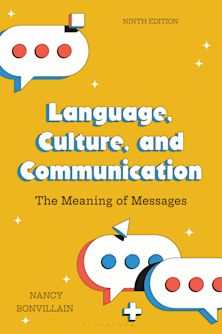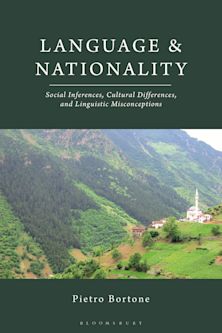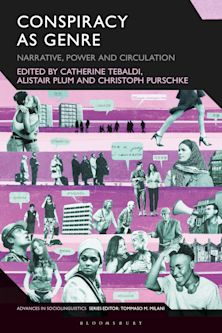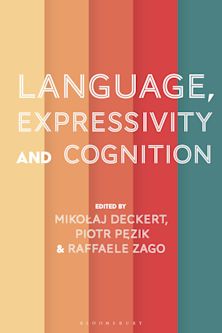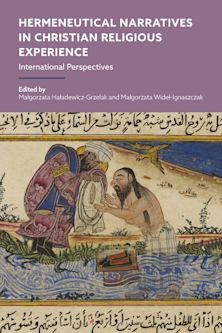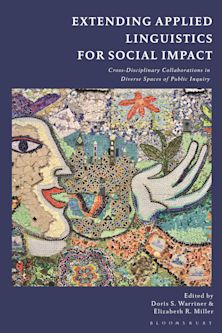- Home
- ACADEMIC
- Linguistics
- Sociolinguistics and Linguistic Anthropology
- Language Ideologies and Media Discourse
Language Ideologies and Media Discourse
Texts, Practices, Politics
Language Ideologies and Media Discourse
Texts, Practices, Politics
You must sign in to add this item to your wishlist. Please sign in or create an account
Description
The book is tightly focussed on the relationship between language ideologies and media discourse, together with the methods and techniques required for the analysis of that relationship. It also places emphasis on television and new-media texts, incorporating and expanding upon recent theoretical insights into visual communication and multimodal discourse analysis.
International in scope, this book will also be of interest to students from a wide range of fields including linguistics (particularly sociolinguistics and linguistic anthropology), modern languages, education, media studies, communication studies and cultural theory.
Table of Contents
1. Tommaso M. Milani & Sally Johnson (University of Leeds, UK)
Part I: Standards and Standarisation in National and Global Contexts
2. Metalinguistic discourse in and about the media: some recent trends in Greek and German prescriptivism
Spiros Moschonas (University of Athens, Greece) & Jürgen Spitzmüller (University of Zurich, Switzerland)
3. Globalising standard Spanish: the promotion of 'panhispanism' in the Spanish press, Darren Paffey (University of Southampton, UK)
4. Language games on Korean television: between globalization, nationalism and authority, Joseph Sung-Yul Park (National University of Singapore, Singapore)
Part II: Planning and Policy in Media Programming
5. Planeta Brasil: language practices and the construction of space in Brazilian TV abroad, Iris Bachmann (University of Manchester, UK)
6. Sociolinguistic practices, media politics and Greek Cypriot TV series: reproducing language ideologies, Vasiliki Georgiou (University of Southampton, UK)
7. Language ideologies and state imperatives: the strategic use of Singlish in public media discourse, Michelle M. Lazar (National University of Singapore, Singapore)
Part III. Media, Ethnicity and the Racialisation of Language
8. Lost in translation? Racialisation of a debate about language in a BBC news item, Adrian Blackledge (University of Birmingham, UK)
9. Metadiscourses of race in the news: the Celebrity Big Brother row, Bethan Davies (University of Leeds, UK)
10. Ideologising ethnolectal German, Jannis Androutsopoulos (King's College London, UK)
Part IV: Language Ideologies in New-Media Commentary
11. 'Black and white': language ideologies in computer game discourse, Astrid Ensslin (University of Bangor, Wales)
12. Whose voices? A hypermodal approach to language ideological debates on the BBC 'Voices' website, Sally Johnson, Tommaso M. Milani & Clive Upton (all University of Leeds, UK)
13. 'It's not a telescope, it's a telephone': encounters with the telephone on early commercial sound recordings, Richard Bauman (Indiana University, Bloomington, USA)
Commentary
14. Monica Heller (University of Toronto, Canada)
Index
Bibliography
Product details
| Published | 24 Dec 2009 |
|---|---|
| Format | Ebook (PDF) |
| Edition | 1st |
| Extent | 312 |
| ISBN | 9781441182739 |
| Imprint | Continuum |
| Series | Advances in Sociolinguistics |
| Publisher | Bloomsbury Publishing |
About the contributors
Reviews
-
"Language Ideologies and Media Discourse is an excellent collection which demonstrates the complex and multilayered ways in which language value is shaped by both media power and media use, and reciprocally, how media power and media use themselves are entangled at every step with the value-laden nature of language. It joins a growing body of work within sociolinguistics, linguistic anthropology, and discourse analysis devoted to prying apart the always and everywhere socially, politically, historically, and culturally-charged nature of language use and language value. Here we see in bold relief, just how language choices, linguistic registers, discursive idioms, and linguistic labels across a range of media (e.g. television, newspapers, radio, Internet, and computer games) have consequences for national, ethnic, and global affiliations, as well as the very tenor of people's affective encounters with media technologies." -Debra Spitulnik, Associate Professor, Department of Anthropology, Emory University, USA
-
English-speaking academics in the field of language ideologies will appreciate it and feel familiar with many of these topics ... [M]any contributions can open doors for the study of the social dynamics of cultures and ideologies.
Yves Laberge, Affiliate Researcher, Équipe FQRSC, and member of the Centre institutionnel de recherche en éducation, environnement, écocitoyenneté, UQAM, Canada, Discourse & Communication















